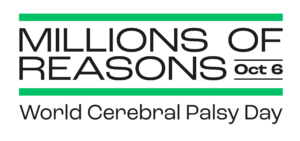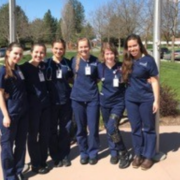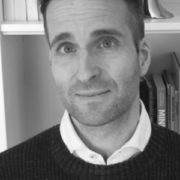Families are travelling as far as five-hours on a round trip to bring their kids with CP to Gympanzees’ all-inclusive pop-up leisure centre.
You might wonder why anyone would travel that far to go to a gym. For these families and their often-isolated children, the wonderful results being seen by this first-of-its-kind program make it a no-brainer.
Reportedly, 84 per cent of UK families with a child with a disability can’t access regular leisure activities. That sort of inactivity then has a knock-on effect for that child’s physical and mental health.
It’s not only the child that is impacted -this kind of societal isolation has an enormous impact on families. Reports suggest that 72 per cent of parents in this situation also experience mental health challenges related to the isolation.
Enter Stephanie Wheen-Gympanzees’ Founder and CEO, and Physiotherapist for children with cerebral palsy.

In 2016, Stephanie began extensive market research and early planning on how to overcome this issue, specifically in the Bristol area.
It was the tipping point for many lives to be uplifted by what was to come.
The project
All that market research led Stephanie to create Gympanzees, a fully inclusive leisure facility which would cater for people from 0 – 25 years of age with any ability.
The centres have many different types of rooms that each offer a unique way of getting active and having a sensory experience, including:
- Sensory rooms
- Music rooms
- Indoor and outdoor playgrounds
- Space for soft play
- Trampolines
- A gym
- Therapy rooms
- Studios for classes such as yoga
Her vision was about creating a safe space for people with disabilities to become fully engaged in play-motivated exercise. She also wanted families to have the support of being able to interact with one another.
“The major goal of Gympanzees is to encourage fitness in young people through play, using highly trained staff who can engage with each visitor using specialised equipment,” says Stephanie.
So, with all that in mind, she pitched her idea for Gympanzees to the Natwest Accelerator program and incorporated as a social enterprise in 2017.
The newly formed social enterprise went on to make plans for building the first permanent Gympanzees facility, but it became quickly apparent that this would not be a fast process.
Not wanting to lose momentum on addressing the need, Gympanzees became a pop-up exercise.
The first four-week Gympanzees pop-up was held at a special school during the UK Summer of 2018, supported by more than 80 volunteers and members of staff.
Every day, close to 56 children came through the pop-up gym.
The following Easter, Gympanzees held their second pop-up which saw tremendous growth with close to 80 children coming through the daily.
“We’re running pop-ups in school holidays because we know that’s a time when the families of children with disabilities feel isolated,” says Stephanie.
Alongside the pop-up gyms, Gympanzees has also grown a thriving online community, with social media being used to make sure people know when and where all the action is taking place. It’s also creating a place for families to communicate outside of the pop-up events.
The results
To-date, more than 527 people with CP have visited one of Gympanzees’ three pop-ups, and more than 3930 people have visited in total.
“Our research tells us that 98 per cent of those people loved their experience and would come again,” says Stephanie.
“Every parent tells us we offer unique facilities for them and their child that can’t be found elsewhere,” she says.
Approximately one in five visitors to a Gympanzees pop-up will travel for over two-hours for the experience.
“Several of our visitors spend close to a five-hour round trip just for one session,” says Stephanie.
“This tells me how desperate the need is for our service.”
To evidence the need and the results, three interns from the University of Bristol have joined with Stephanie purely to conduct research on the Gympanzees facilities and the impact it’s having on those it’s intended to help.
A subsequent report has been produced by the interns which lends great credence to the achievements of Gympanzees.
The report incorporates a substantial element of feedback on experiences had by those attending the pop-ups and has become a central feature of how Stephanie and the Gympanzees crew continue to evolve what they do.
“Our visitors have experienced countless health benefits, including drastic improvements to sleep patterns, new strengths, confidence in walking and in their other gross motor skills,” Stephanie explains.
Among the success stories coming from the early days of Gympanzees is that of a six year old who managed to take five steps on her own using her frame. Prior to this, her mum would move her legs for her, so this shows the scale of the progress made at the pop-up.
Another six year old boy learnt to hold his head up for the first time and was able to do so for a full 10-minutes.
“A particularly special moment for Gympanzees was with a man living with CP who joined his 3-year old son on a trampoline for the first time with the aid of hoists,” says Stephanie.
“The son had no disability and so this showed us the effect on the quality of life for our beneficiaries. It’s so obvious in the smiles and the strengths we see develop in our facilities.
“Particularly special was seeing a three year old boy laugh for the first time while using our equipment with his mum. She said it was the best moment in the last three years of her life.
“Our ethos and focus is on fun,” says Stephanie who shares the quote below which came from one parent that she feels tells the whole story:
“There is a difference between your child being tolerated and celebrated, and here it is so clear they are celebrated.”
It’s not just the people who use the gym facilities at Gympanzees that are benefiting from this initiative either.
The well-run café that supports the Gympanzees pop-ups is staffed by a volunteer adult with CP and his carer.
“It’s another great testament to our inclusivity, demonstrating how people with disabilities are central to the delivery of our project,” Stephanie shares.
Future plans
Right now, Stephanie is most focused on proving that the Gympanzees pop-ups can generate the minimum number of attendees each month to deliver financial sustainability for a permanent bricks and mortar facility.
“Each of our pop-ups grows incrementally, requiring more rooms and equipment, larger rooms and longer hours,” she says.
“We are planning to continue our pop-ups and building our supporter base, business model and offering the much-needed services.”
The hope is to secure funding and land for a permanent Gympanzees leisure centre to be built by 2022, with a long-term vision to open 13 such centres across the UK.
“On weekdays the facility will be used for regular play as well as therapy sessions, and on weekends, the studios will be available for birthday parties or other celebrations,” says Stephanie.
“It will be a social space for people to meet up, get to know and support each other.”
An online shop is also in planning so parents can purchase the equipment their children are using at Gympanzees and enjoy continuing development at home.
Stephanie has already been approached by other therapy centres and interested parties from across the UK who are interested in the Gympanzees model. This has led to investigations around the possibility of franchising the pop-ups with the aim of testing the concept in areas outside Bristol before building further bricks and mortar centres.
Gympanzees won the Major Award for Quality of Life in the 2019 World Cerebral Palsy Day Awards.
To learn more, visit gympanzees.org
Dr Olaf Verschuren has been working with the Centre of Excellence for Rehabilitation Medicine, the UMCUtrecht Brain Centre, Utrecht University and De Hoogstraat Rehabilitation in the Netherlands for over a year to tackle the challenge of poor sleep, nutrition and physical activity in children with CP.
The doctor and his colleagues started by interviewing the parents of 15 children living with CP.
The clinicians wanted to know what concerns existed around making sure their children received proper sleep and nutrition, and that they were getting enough daily movement.
It quickly became clear to the project group that parents struggled in all three of the key areas being addressed. They worried about doing too much, as much as they worried about doing too little.
Also clear from the interviews, was the absence of evidence-based resources that could effectively support the families through this specific challenge.
The project team were well aware of the strong correlation between long-term health quality and sleep, nutrition and physical activity.
Obviously, it’s not practical or cost effective for families to bringing their children to see clinicians every day. So, how can parents give their children the highest possible quality of care in their homes?
Collaborating with parents
Dr Verschuren and his colleagues began collaborating with parents to develop online resources that would be useful in day-to-day family practice.
Alongside parents, the project group started identifying relevant sub-themes of sleep, nutrition and physical activity.
The collaboration was effective. A care-path was formed that followed three steps:
- Screening children with CP in the 0 – 8 years age group
- Identifying children with, or at risk of, problems with sleep, nutrition, and/or physical activity
- Providing care and support for these children and their families, starting with the resource development.
Bringing home the resources
In June 2019, the project published a series of resources to the CP-Nederland website (a patient focused website from the organisation previously known as BOSK) to address each of the three related health areas.
The resources are presented in a variety of easy to understand formats including infographics, videos, posters, cards and text.
In the first two months alone, the new web pages had been visited more than 1000 times and the infographics were downloaded more than 400 times.
Anecdotal outcomes
Most of the feedback received by the project team is around sleep.
“Screening for sleep opened the eyes of many parents,” says Dr Verschuren.
“But also, the physicians did not realise that sleep affected so many children and their parents.”
From the 80 parents the team have screened in the past six months, more than 75 per cent indicated one or more sleep problems.
Most parents have reported feeling that the website provided plenty of information on all the three areas covered by the project.
“There have been many suggestions that a great addition to the website would be a child-friendly resource as well,” says Dr Verschuren.
“We’re hoping to find funding to work on that in the near future,” he says.
Parents have also expressed their appreciation for all the information on the website being based on evidence that it is clearly organised and on a website they trust.
Future plans
Dr Verschuren says that being involved in a rehabilitation program is like being a professional athlete.
“For professional athletes, physical activity and exercise training programs are just part of their formula for success,” he says.
“Elite athletes know the importance of nutrition and sleep as ADDITIONAL key factors in sporting success.
“Physical activity, sleep and nutrition are considered the three main components that allow an individual’s body to achieve its goals related to activities in daily life.
“That’s why we need to pay attention to them and to optimise them for the maximum outcome we (the child, parents and clinicians) are aiming for,” he says.
While the website has filled a void for families in The Netherlands, Dr Verschuren and his colleagues know that easy to access information is not going to be enough on its own to transform the lives of children with CP.
They have their investigations set firmly on understanding:
- how parents perceive the use, utility, usefulness and impact of the online resources
- what more they need to enable them to integrate that knowledge into their lives and
- how to empower them to support the long-term health of their child with respect to sleep, nutrition and physical activity.
In the meantime, the group are translating their resources into English to make them more accessible across the World.
This project was funded by the Innovation Fund from Health Insurance Companies in The Netherlands.
To see the full suite of resources, visit the CP Nederland website.
No man is an island, so the saying goes, however most people living with cerebral palsy in Ghana are isolated from public life.
People with cerebral palsy are denied education, sometimes basic health care and almost completely isolated from public activities. Mostly children with cerebral palsy are kept indoors and this is not the making of only the parents, but the society.
The facilities to help people living with cerebral palsy to have an enhanced life are simply not there. Additionally, awareness about cerebral palsy is very low, even among the educated.
Some parents get frustrated to get point of wishing their own children with cerebral palsy dead, yet others are reportedly frustrated to the point of killing their own children.
There is also no clear pathway for parents or care-givers to follow in terms of managing a person or child with cerebral palsy and those who are able to sustain medical care and support do so at huge financial cost.
Ghana is therefore denied the opportunity to access the impact that people with cerebral palsy could have in terms of their contribution to national development instead many are forced to beg on the street under the scorching sun or rains.
Parents are burdened with managing children with cerebral palsy alone, forcing many parents and care-givers to abandon their jobs or their careers.
Special Mothers Project
The Special Mothers Project, an advocacy and awareness creation organization on cerebral palsy was started when I realized the very low level of awareness on the disorder.
The project creates a platform for parents and care-givers of children with cerebral palsy to get together, share ideas and see how we can together influence policy to favour these children.
As a mother of a 3 year old beautiful girl who has cerebral palsy, I believe that given the necessary supportive environment coupled with the right equipment that facilitate movement and the right policy framework, children with cerebral palsy in Ghana can have an enhanced life.
The Special Mothers Project uses the platform as a skill learning platform where parents and care-givers exchange ideas, share opinions and encourage one another.
With the necessary support and funding, the Project organizes periodic workshops that brings professionals like physiotherapists, speech therapists and special educators together with parents or care-givers to impart knowledge and share ideas.
It also serves as a counselling point to new mothers with cerebral palsy children, given my background in psychology and as a communications professional, as well as the experience of providing social care for children with cerebral palsy
The Project also does a lot of news articles on cerebral palsy and, when given the opportunity, uses the radio platform to educate the public about cerebral palsy.
Education a priority
My biggest desire will be to have government formulate favourable policies that will enable children with cerebral palsy get educated. As is it now, in Ghana, schools use their discretion to either accept or deny a child with cerebral palsy admission.
This is due to the fact that many schools do not know how to handle a child with cerebral palsy. Even though there are special schools in Ghana, they are for children with autism, Down syndrome, blind and deaf.
There is absolutely no provision made for a child with cerebral palsy to be educated in Ghana, so if a parent is not a bit more forceful the child ends up being isolated or killed.
I will be more than glad if the Ghanaian society and the government pay more attention to issues related to cerebral palsy. To at least give these children access to basic education, health care and to enhance their lives to enable them contribute their quota to national development.
WEBSITE
© World Cerebral Palsy Day 2020 | All Rights Reserved | Site by Ripple Marketing Australia




